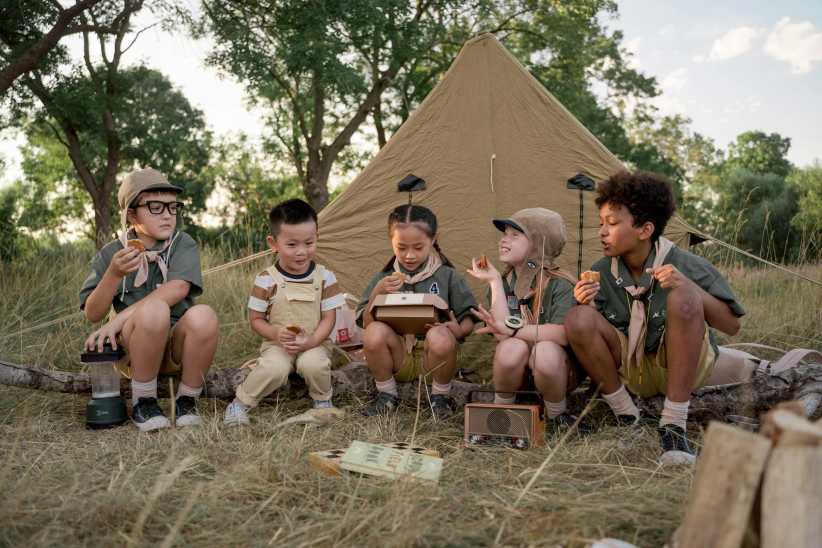Sending your children to overnight camp can be one of a parent’s most difficult decisions. The idea of entrusting others with your children for the first time is difficult enough. But just as difficult is knowing when to do it. Some parents hope that a successful day camp experience prepares a child for overnight camp. Others guess that a child is ready at a certain age. Still others ask friends how their children fared at overnight camp and apply that information to their situation. While all of these decision-making methods can work, they are just as likely to not do so. . So, just when is your child ready for overnight camp? Many children are ready by age 6, and most who are 10 or older will love overnight camp. And yes, attending day camp first might help. However, since every child is different, there are some signs that parents should look for in their children before registering:
A desire to go to overnight camp. If your children haven’t said that they want to attend overnight camp, gather information about the overnight camp experience and share it with your kids, and try to get children who have attended overnight camp to speak with your youngsters about their experiences. Then, ask your children if they are interested. If they say yes, they may be ready. If they say no, they are not ready; ask again next year. Parents may become convinced that their children will benefit from and enjoy overnight camp even though the children say they don’t want to attend. I occasionally hear, “If I could just get her there, I know she’ll love it.” Sometimes, that’s true. Encouragement is fine. However, forcing kids to attend overnight camp usually backfires.
A successful experience away from home. It’s best if your child has stayed overnight at least once, without you, at a relative’s or friend’s house, and has enjoyed it.
Ability to accomplish the tasks of daily living with little assistance. Can your child wash himself and brush his teeth? Can she comb her hair and tie her shoes? Kids usually succeed at overnight camp if they need a reminder, or even a bit of help, in accomplishing the tasks of daily living. However, as much as camp is a place to learn skills, washing, brushing and combing are best left to others to teach.
Ability to express needs. Your child needs to be able to say that she doesn’t feel well, needs help learning a skill, or doesn’t know where an activity is conducted. It’s OK to be shy, but basic needs must be expressed.
Ability to make basic decisions. Camp involves wonderful choices and challenges. Do I swim or play soccer? Do I hang out with Jeff or Malik? Do I wear my shorts or jeans? No, a well-trained staff won’t let a child wear shorts when it’s cool outside; however, a child who is used to mom or dad making most decisions for her probably isn’t ready for overnight camp.
Ability to interact with other children. If your child depends on you for socialization, or is afraid of most other children, overnight camp could be the perfect place to change that pattern. On the other hand, overnight camp is often problematic for kids who don’t interact well with other children. If your child falls into this category, discuss the situation with the camp director before enrolling. If the camp staff is prepared for a child with special socialization needs, it may be able to turn a potential problem into a success story.
Respect for adults. Many adults will supervise your children at camp. Campers must be willing to follow directions and meet the camp’s expectations, interact cordially with adults, and value adults as teachers.
Willingness to try new things. Overnight camp is magical. It has more activities and more ways to grow and build skills than any other institution. Children should be excited by the possibilities, eager to learn and willing to experience the unfamiliar.
Willingness to experience the outdoors. At most overnight camps, kids are outside much of the day. Some activities will be in the woods. New campers who’ve spent most of their lives inside are usually very, very happy at overnight camp. However, in order to be happy, campers must be willing to get a little dirty, to get a little wet, and to cope with an occasional bug.
If your children have all of the above qualities and you still feel they are not ready for overnight camp, you might ask yourself: Is it really you, not them, who isn’t ready? Many parents tell me how worried they are to send their kids to overnight camp. I don’t blame them. After all, overnight camp is usually the first time they will “let go” of their children. If you are having a difficult time letting go, I suggest that you consider this: If your children are ready, overnight camp is not only going to be an important experience for them, but it will be for you, too.
CHRIS SCHEUER is director of camping for YMCA Camping Services of Greater New York, a branch of the YMCA of Greater New York. His branch operates two traditional overnight camps; Conservation and Adventure Camp; sports camps for volleyball, gymnastics and judo; and a day camp. Chris can be reached at (845) 858-2200.




















